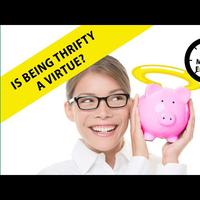Is being thrifty a virtue? - 6 Minute English - YouTube
Hello. This is 6 Minute English from
BBC Learning English. I'm Neil.
And I'm Sam.
Are you a saver or a spender, Sam?
Well, I'm trying to limit my spending
right now because I'm saving up
for a deposit to
buy a house.
Saving money is not always easy - as we'll
find out in today's programme, which is all
about 'thrift'. 'Thrift' is not a simple idea
to define. It's to do with living a simple
life free from the need to constantly
buy the latest products.
Today's consumer culture encourages us
to 'spend, spend, spend', but
it hasn't always
been that way. The Victorians for example
told people to 'save up for a rainy day',
meaning to keep some money back
in case of unforeseen emergencies.
But before we discover more about that,
it's time for today's quiz question. If you're
trying to save money you probably
know how hard it can be. So my
question is: what percentage
of people in the UK, do you think, have
less than £1000 in savings? Is it:
a) 5%, b) 15 %, or c) 30%?
Well, if I'm anything to go by
I'd say c) 30%.
OK. Well, we'll find the correct answer out
later. I mentioned before that 'thrift' is
a difficult idea to define, so here's
Alison Hulme, a lecturer at
the University of Northampton,
explaining more to BBC Radio 4's
programme Thinking Allowed:
There are two dictionary definitions
of thrift. The older of the two comes
from the word 'thrive'
etymologically, and described thrift
as the ability to live well
and to flourish, so it's
that sense of human flourishing.
The more recent definition is
the one we're probably
more familiar with which is about
frugality. All of that said, it's
been used historically
of course by various people in various
moments in various different
places in very different
ways and they've often had
a social or religious agenda.
It seems the oldest definition of 'thrift'
has nothing to do with
saving money and is
connected to the verbs 'thrive' and
'flourish' - meaning to grow
or develop successfully.
It was only later with the Puritans - 16th
century English Christians
with a reputation
for strict discipline - that the meaning
of thrift changed and became
associated with
frugality - being careful not to spend too
much money or eat too much food.
The Puritans believed that being
frugal was a religious virtue and
that people ought to
save money in order to give
to others in need.
Later on the meaning of 'thrift' changed
again. During the Victorian era,
it was connected
to the idea of managing your own money
in order to be a responsible citizen.
Throughout history then, there have been
different versions of 'thrift',
and this may be because
different religions or social groups
had their own agenda - a specific
aim or reason for
a particular group to do something.
For example, the Victorian
definition of thrift was based
on a social agenda about being
a respectable member of society.
Ideas about frugality and thrift changed
again during the Second World War
when the public
was encouraged to avoid waste
so that every material resource
could go into the war effort.
And in the post-war period, it changed
again as people's wealth
and standard of living
increased. Here's Alison Hulme again:
It's the idea that once people had enough
to meet their kind of
basic needs there was
this kind of moral slide into consumerism.
It's not a view that I subscribe
to in a simplistic
sense myself - I think there's a very fine
line to tread here.
There's no point denying
that, certainly in the developed world,
there's been a rise
in consumer capitalism, that's
just a truism, but thrift hasn't declined.
In modern times, people's motivation
to save up and be thrifty
declined once they had enough
to meet their basic needs - the
basic necessities needed to survive,
like food, clothes and
shelter and nothing extra.
Alison mentions that once these
basic needs were satisfied,
people moved away from thrift
into consumerism, the desire to buy
'luxury' products which
were not absolutely necessary.
According to some, this created
a moral slide - a decrease in the
standards of behaving
in good, fair and honest ways.
The rise in consumer capitalism
we have seen around the world
is an example of a truism
- something that is so obviously true
it is not worth repeating.
What is worth repeating
is the quiz question, Neil.
Yes, I asked you how many British people
had savings of under £1000.
And I said, c) 30%
In fact, Sam, it's b) 15%.
So I guess I'm not such a bad saver
after all!
OK. Well, today we've been talking about
the changing meanings of 'thrift',
an idea connected
to frugality - being careful
not to spend too much money.
The original meaning of 'thrift' was
to flourish - grow or develop
successfully - but that
definition changed as different religious
groups, like the Puritans, promoted their
own agenda - aim or reason for a
particular group to do something.
In recent times, people's ability
to meet their basic needs - the
necessities for survival
like food and shelter, have reduced the
importance of 'thrift', which
some believe has created
a moral slide - a reduction
in standards of moral behaviour.
And the associated rise of consumer
capitalism is an example of a truism -
something that
is obviously true and
generally accepted by all.
That's all for now. Join us again
next time for more topical discussion
and vocabulary. Bye for now!
Bye bye!

